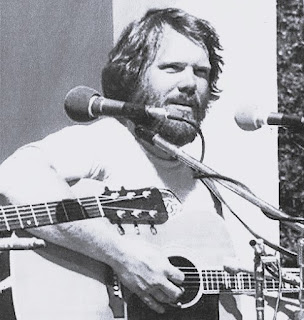First and foremost, Bob Dylan's Rolling Thunder Revue was somewhat of a one of a kind spectacle, the likes of which we wouldn't see again. Dylan had already resurrected his career just before with Blood On The Tracks, though the touring spectacle certainly generated an interest in Dylan not seen in years. The Rolling Thunder Revue didn't just help revive Dylan's career, though. It sure as hell revived Roger McGuinn's creative spirits. By the time Rolling Thunder, uh, rolled around McGuinn was pretty busy doing nothing, when not coasting on his name and reputation. His last album, Roger McGuinn & Band, was a critical and commercial flop, though I maintain that it is not nearly as catastrophic as a bunch of folks would tell you. But yeah, repurposing old Byrds and Dylan songs and otherwise mostly outsourcing the songwriting to his backing band didn't help with the impression/accusation that McGuinn was only half-heartedly following his music career.
To be fair, that career had flatlined in the mid-70s, with McGuinn's first two albums being decent but completely by the numbers versions of what people would expect from a Roger McGuinn record. So, yeah, Rog definitely needed a pick me up in late 1975, and Dylan's phone call to just come out and join the circus troupe was exactly that. His involvement in Rolling Thunder was relatively small - he'd get a short solo set and then often stayed with the band for Dylan's closing set - but it definitely revived and reconnected McGuinn with rock'n'roll and gave his studio work something it didn't have in a long while - purpose.
There is real bite and real commitment to these performances, something that was sorely lacking from his previous albums. From the opening chords of album opener "Take Me Away", McGuinn's ode to the Rolling Thunder Revue, the music is tight, McGuinn is in fine voice and multiple highlights follow each other. Incidentally, I am personally not a huge fan of pirate yarn "Jolly Roger", but it's a fan favorite for many. "Rock And Roll Time", co-written with Dylan Crony and Rolling Thunder Revue musical director Bobby Neuwirth as well as Kris Kristofferson, has him on his punk-iest snarl of a vocal, something he would put two years later to great use on "Shoot 'Em". "Partners In Crime", a loving send-up of the Chicago Seven does have all the hallmarks of a McGuinn political satire, using the pastiche approach already familiar from Byrds songs like "I Wanna Grow Up To Be A Politician".
"Round Table" is another McGuinn rocker about - you guessed it - King Arthur's Round Table, while his second stab at the traditional "Pretty Polly" (the first was an aborted attempt for Sweetheart Of The Rodeo that established McGuinn's arrangement of the song and did end up on my alternate version of the album) is - true to some of the harder edged vocals on the album - a much more frantic, even hysterical performance. Johnny Rogan calls it "much more psychotic" which sounds about right.But McGuinn was of course also the master of vocal imitation, used to full effect here: Dylan's "Up To Me" sounds appropriately Dylan-ish, while ""Dreamland" is sung in a higher register to remind you of its author, Joni Mitchell.
A big part of the heavier rock sound of Cardiff Rose is of course producer Mick Ronson, whom McGuinn met on the Rolling Thunder Revue. Considering the quality on display here, McGuinn must've been hugely disappointed when the album he was rightfully proud of couldn't even beat Roger McGuinn & Band and actually missed the Top 200 altogether. No matter how you slice it, this is a really good album, and it is arguably the high watermark of McGuinn's solo work, at least until the comeback/legacy sequel album Back From Rio in 1991 which to my mind is a little too conscious about being 'a Roger McGuinn album'. Cardiff Rose is not, it simply stands as a great collection of songs.
This is part of a two-tier project. Be back in two days for Band Of Pirates, a mini-album companion piece to Cardiff Rose, which is obviously a One Buck Records exclusive. We're not just lazily grabbing things from the shelf here, people...even if they are great albums...




































